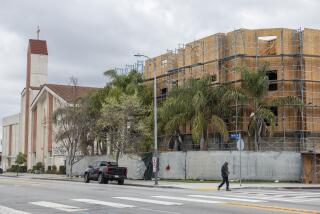High Court Will Weigh San Jose Rent Control : Justices to Rule on Whether Statute Aiding Poor Illegally Takes Private Property for Public Use
WASHINGTON — The Supreme Court agreed Monday to decide the constitutionality of a rent control law that forces landlords to hold down rent increases for poor tenants.
This is the latest in a series of legal challenges to rent control, but marks the first time the justices will consider whether such laws violate the Constitution’s ban on taking private property for public use. Last year the justices rejected the notion that the laws constituted illegal price fixing.
In the latest case, rental property owners in San Jose have charged that that city’s rent control ordinance improperly forces them to subsidize poor tenants.
‘Shifts the Burden’
The law, which limits increases that would pose an “economic hardship” for a renter, “shifts the burden” of helping the poor from the public to private property owners, the San Jose apartment owners said in their appeal to the court.
” . . . Providing welfare for the needy is a governmental enterprise, the cost of which should be spread through general taxation,” they said.
Eighteen cities in California--including Los Angeles, San Francisco, West Hollywood and Santa Monica--have rent control laws, but attorneys familiar with the ordinances differed Monday on the potential impact of a high court ruling in the San Jose case.
The lawyers on both sides in San Jose stressed that the law there is “unique” in explicitly authorizing the rent control board to take into account the financial status of the tenants.
But an attorney for the California Apartment Assn. said that all the state’s rent control laws allow consideration of “other relevant factors,” and that such factors could include a tenant’s ability to pay.
“We believe this is a much broader issue than just the San Jose ordinance,” attorney Jon D. Smock said.
Upheld by State Court
He noted that the California Supreme Court, on a 4-3 vote, had upheld the San Jose ordinance last year, thus giving other cities a green light to consider the welfare of the tenants in setting rate increases.
Ironically, the San Jose ordinance is viewed as relatively generous to property owners, even by the attorneys challenging it. It permits price jumps after an apartment is vacated and takes market rates into account in setting increases. Moreover, the tenant “hardship” provision only kicks in when proposed rent increases are more than 8%.
“This is probably the most generous rent control law you could find, but property owners can never find one that they like,” Joan Gallo, San Jose city attorney, said.
Last week the Supreme Court rejected a challenge to Santa Monica’s much tougher rent control law, but the appeal stressed that it was unfairly “confiscatory” toward property owners. By contrast, the San Jose appeal focused on the Constitution’s Fifth Amendment, which states that “private property (may not) be taken for public use, without just compensation.”
The San Jose ordinance was enacted in 1979, but it was struck down by a district judge in 1980. It sat in state appeals courts until last year when the California Supreme Court reinstated it.
Decision Likely Next Year
The case of Pennell vs. City of San Jose, 86-753, will be argued before the court in the fall and decided by June, 1988.
In other actions, the court:
--Agreed to decide whether federal employees can be sued in personal injury suits (Westfall vs. Erwin, 86-714). The government says that in almost all cases its employees are immune from such suits under federal law, but some state courts have disagreed.
--Agreed to decide whether a city can stop a newspaper from putting coin-operated news racks on its sidewalks. Lakewood, Ohio, a Cleveland suburb, tried to stop the Cleveland Plain Dealer from placing its news boxes there, but a federal court struck down the city’s ordinance as a violation of the free press clause of the Constitution.
In its appeal of the case (Lakewood vs. Plain Dealer, 86-1042), the city said that there “can be no First Amendment right to take city property for the erection of vending machines.”
More to Read
Sign up for Essential California
The most important California stories and recommendations in your inbox every morning.
You may occasionally receive promotional content from the Los Angeles Times.











